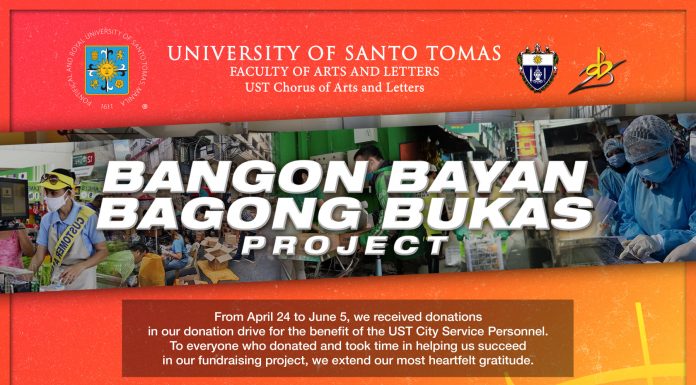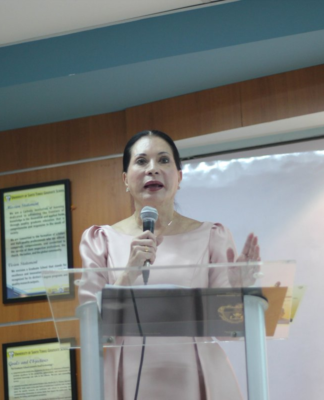 “Nobody, not even the rain, has such small hands.”—E.E. Cummings
“Nobody, not even the rain, has such small hands.”—E.E. Cummings
I had an initiation of sorts with rain. My freshman enrollment in UST was met by a downpour. My mother and I were on the jeepney on España Boulevard when almost instantly the water rose to knee-level. We could not move. Floodwater had already clogged all the drainage; a swarm of cockroaches peeked through the cracks of the floor; and large black rats were carried off by the torrent. I had to wade through the high water barefoot just to get across! Of course UST didn’t suspend the enrollment; everything went by normally. As with the usual Welcome Walk for freshmen, rain is another invitation, a rite of passage with nature so to speak: one of many stories in our University’s rain lore.
Although my getting into the Varsitarian had nothing to do with rain (or whichever calamitous event that I could boast off to my grandchildren in the future), I could fairly say that it was a rain of blessings, a surfeit of things (of both good and bad) that I will carry with me in the journey—and with which I plan to carry afterwards. Coming to “V” I was an intrepid young man, a heretofore arrogant person in the finest sense (and I cannot deny I no longer am today).
Before becoming the managing editor of “V”—before the nerve-wracking decision by the Selection Committee of this paper to appoint me in a position that I had not applied for—I was first a Witness (religion) writer and editor. I had little knowledge of the Church back then. But because of my eventual engagement with clergymen and theologians, and having attended multiple Church congresses, I grew fond of the Church, as well as developed a respect not only for her, a singular faith, but for other faiths as well. I remember one priest saying that although we are divided by different faiths, we are gathered under one solicitous God.
During my stay in the “V” I was called illiterate among many other pejoratives by my interviewees, one of whom was the late Cardinal Jose Sanchez who had noted my ignorance about Church history. I also became a constant target of our professors mocking the Varsitarian’s rather unpopular “going against the grain” stand on the reproductive health bill. (They should at least thank me for not exposing their pro-RH, anti-life stand before the Dominicans and the Philippine bishops.) On the same issue and other divisive matters, I was assaulted many times by foes and friends alike on the social media. But I stood unfazed.
To be honest, although I was taking up B.S. Biology, my inclination was towards the arts. I felt I belonged elsewhere. In fact on my third year, feeling my course’s weight bearing down on me, I told my mother I wanted to shift to journalism or perhaps literature. With a disdainful look on her face, she said, “You should have done that a year earlier,” because it meant buying me an extra year in UST, something my family could no longer afford. But soon I was able to bring myself to the thought that familiarity breeds not so much contempt as blindness. I knew had I gone on to journalism or literature I would not have developed the same enthusiasm as I have for writing now. I’m glad I stuck by Biology.
It was in the “V” that I discovered my love for poetry. I devoured poetry. As what Mark Strand and Rumi did, I ate it gulp by gulp. It proved a consolation to my gnawing depression, a sort of remedy that soothed my soul. My first poetry book I borrowed from our publications adviser, to whom I owe a lot of books. And this is when I discovered what I really wanted to do in life: not to lead a life of poetry, but rather to live a poetic life.
I owe everything to the Varsitarian. And if not for what I learned in the “V” I would have not gotten into two national creative writing workshops (Iyas in Bacolod and Silliman in Dumaguete). My poetics and sensibilities were shaped in and by the “V,” something I wish to keep long after.
Our last column piece for the Varsitarian is called the “goodbye column” for many reasons. But I would like to think otherwise. This is not goodbye, and if it is, it is a farewell only for the better part of myself in this publication. Borrowing Jeanette Winterson’s words: You become everything you meet, and everything you meet becomes a part of you. To this I could proudly say: “Once a V staffer, always a “V” staffer,” a mantra staffers invoke coming in and going out the Varsitarian. But I would say it now more than I ever did.
A poem by Mary Oliver reels in my head every now and then. Her most famous poem, “Wild Geese,” really struck me hard. It says, “The world offers itself to your imagination, /calls to you like the wild geese, harsh and exciting.” We have the freedom to choose between the natural and the artificial, the ephemeral and the permanent, the good and the evil. As for me, I choose to keep them to myself, to my poetry.
To this day I wouldn’t consider myself a journalist—although “V” gave me that sense of an identity—and I don’t know if I will ever walk that path. I do not know yet. Right now I resign myself more to being a creative writer. But there are more things out there to contain myself with. The world is big, much, much bigger than the usual space I’ve been used to. But I would have to take a rain check for now.
It has come again to this: I see myself in the garden of forking paths, unknown yet knowable, but now with the promise of rain.
















